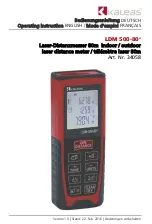
Analyzing a Sine Wave
1-9
SR785 Dynamic Signal Analyzer
Press [Marker Center]
This sets the span Center Frequency to the Marker
Position (for the active display). The signal will be
at the center of the span. Further adjustments to the
span will keep the center frequency fixed.
10. Let's look at the signal distortion.
Press
[Freq]
Select the Frequency menu.
Press
<Span>
Adjust the Span.
You can also use the numeric keypad to enter the
span.
Enter [1] [2] [.] [8], select (kHz) with the knob,
and press [Enter].
Enter the 12.8 kHz span numerically. Note that the
Center Frequency is no longer 1.024 kHz. This is
because a 12.8 kHz span cannot be centered below
6.4 kHz without starting at a negative frequency.
Press [Auto Scale A]
Adjust the graph scale and reference to display the
entire range of the data. This key can be used at any
time.
11. Let's measure some harmonics using the Marker
Reference.
Press [Marker Max]
Move the Marker to the fundamental peak.
Press [Marker Ref]
Set the Marker Offset or Reference to the
amplitude of the fundamental. The Marker Position
above the graph now reads relative to this offset
(
∼
0 dB). This is indicated by the
∆
in front of the
Marker Position reading. A small flag shaped
symbol is located at the screen location of the
reference.
Use the knob to move the Marker to the
harmonics.
The Marker Position shows the distortion peaks
relative to the fundamental.
Press [Marker Ref]
Pressing [Marker Ref] again removes the Marker
Offset and returns the Marker to absolute readings.
12. Let's have the analyzer measure the distortion.
Press
[Marker]
Select the Marker menu.
Press
<Mode>
Adjust the Marker Mode.
Summary of Contents for SR785
Page 4: ...ii ...
Page 10: ...viii ...
Page 80: ...1 64 Exceedance Statistics ...
Page 158: ...2 78 Curve Fitting and Synthesis SR785 Dynamic Signal Analyzer ...
Page 536: ...5 136 Example Program SR785 Dynamic Signal Analyzer ...
















































